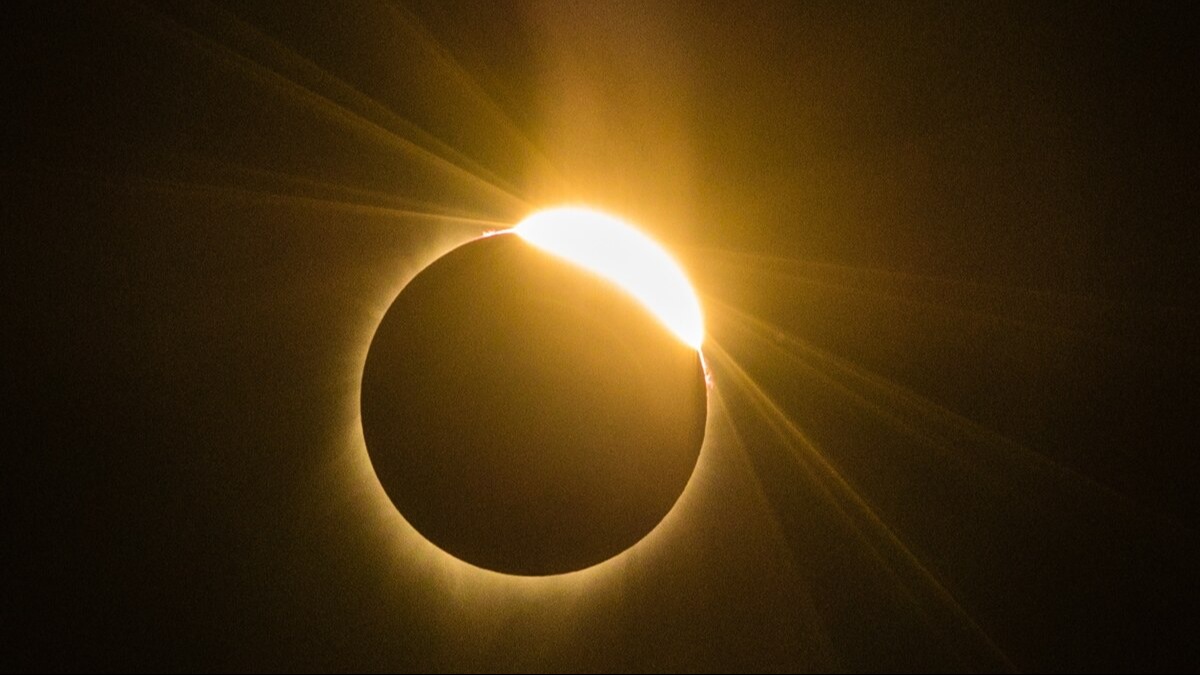Solar Eclipse 2024 Date:
Today, April 8, 2024, marks the occurrence of this year's first solar eclipse, deemed significant from both a scientific and cultural standpoint. Astronomers emphasize its rarity – the first in over half a century – while astrologers highlight its coinciding with the Chaitra Navratri, lending it an auspicious aura. Predicted to manifest in Pisces alongside the Revati constellation, let's delve into why this eclipse is commanding such attention and if the traditional 'sutak' period applies.
Why Is This Solar Eclipse Special? (Eclipse Details)
The Earth orbits the Sun, perpetually rotating on its axis.
On April 8, as the eclipse commences, the Moon will transit before the Sun at an impressive speed of 2400 kilometers per hour
. This will provide a spectacular view of a total solar eclipse to North Americans for the first time in 54 years – a mesmerizing event last observed in 1970 and anticipated to reoccur in 2078.
When Will the Solar Eclipse Occur? (Eclipse Timing)
According to Indian Standard Time, this year's inaugural solar eclipse will grace the skies from the night of April 8 at 9:12 PM until the early hours of April 9 at 2:22 AM, culminating in a duration of 5 hours and 10 minutes.
Where Can the Solar Eclipse Be Seen? (Visibility)
The upcoming eclipse on April 8 will not be visible in India. Instead, its grandeur will unfold across Western Europe, the Pacific, the Atlantic, the Arctic, Mexico, most of North America (excluding Alaska), Canada, Central America, and the northern parts of South America, including the northwest realms of England and Ireland.
Will There Be a 'Sutak' Period in India? (Traditional Beliefs)
Traditionally, a 'sutak' period, a time considered inauspicious, commences 12 hours before a solar eclipse. However, since the eclipse will not be seen in India, the rules associated with the 'sutak' will not apply. Residents may carry on with rituals, dining, and other daily activities without concern.
How to Safely View the Solar Eclipse? (Viewing Tips)
Viewing a solar eclipse with the naked eye is ill-advised due to potential harm. Scientists recommend using specially designed glasses to observe the eclipse to protect one's retina from the Sun's harmful rays.
What is a Solar Eclipse? (Eclipse Phenomenon)
Occurring when the Moon intercedes between the Earth and the Sun, a solar eclipse casts the Moon's shadow on Earth, momentarily halting sunlight from reaching us directly. This causes a temporary dimming of daylight, creating an impression of nocturnal darkness during the day, what we refer to as a solar eclipse.
Mistakes to Avoid During the Solar Eclipse (Eclipse Precautions)
1. Deemed as a period of impurity, refrain from initiating any auspicious acts during the 'sutak', such as weddings, head shavings, housewarmings, etc.
2. Avoid cooking or eating food during the solar eclipse.
3. Steer clear of touching holy basil (Tulsi) leaves; ideally, shelter the plant indoors before the eclipse begins.
4. Do not enter temples or touch idol statues throughout the eclipse period.
5. Hold off on haircuts, shaving, nail trimming, or oil massages from the start of the eclipse to its end.




